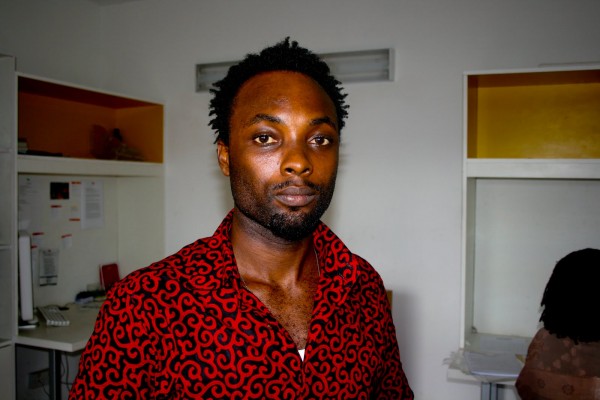
It’s the Port Harcourt Book Festival. I’m speaking to Igoni Barrett, telling him to consider writing non-fiction, to take up the essay form between stories. We are on the grounds of the Hotel Presidential and the basis for our conversation is some brew and the excerpt of his novel published in the Africa 39 collection. To my mind, his story featured in the anthology reads like an essayistic account of the relationship between the Lagos traffic, road users, and the celebrity bestowed on the city’s radio presenters.
“Persistent power cuts in Lagos,” he wrote, “in the whole of Nigeria, meant that battery-operated radios were the entertainment appliance of necessity for both rich and poor, young and old, the city-based and the village-trapped, everyone. Radios were cheap to buy and free to use, no data bundles or subscription packages or credit plans, and they were also long-lasting, easy to carry around, available in private cars and commercial buses, and must important, they were independent of the undependable power grid…Radio was deathless. Radio DJs were superstars.”
Mr Barrett is having none of it, though. ‘I’m not a non-fiction writer,’ he tells me.
Many months later there’s this:
I first met Muhtar Bakare in January 2006, when I travelled to Lagos to ask if he would publish my manuscript of short stories. Before then, we’d exchanged a few emails, as he’d accepted one of my stories for the website of Farafina, the literary magazine he had founded. His emails were terse yet casual, while mine, as I read them now, were fussily formal. I was a 26-year-old university dropout who was desperate to remake himself as a writer, and it was crucial to me that Bakare take me seriously.
Bakare is a man of many parts. He was born to parents of two ethnic groups, a Nupe mother and Yoruba father. He grew up in the Epetedo area of Lagos Island, known for its crumbling infrastructure and slum-like congestion, but now lives in Victoria Island, home to some of the country’s most prized real estate…
***
Achebe’s Curse
As much as I proselytise about prose (playfully among writer-friends and relentlessly via quotes and links to great writing on social media) I truly consider the fairly common idea that a writer sticks to a genre—mostly fiction in Nigeria—wrongheaded. The best writers in the English language, at least the ones with style, with a mastery of the possibilities of the English sentence, write everything: essays, reportage, memoir, fiction, criticism. Hemingway, Orwell, Bellow, Updike, Mailer, Roth, Coetzee, Amis, Heller, Franzen, Rushdie—all writers primarily known for their make-believe have written reams of non-fiction. Never hiding behind the ready, steady pleasures of story, they believe the ability to turn a sentence in prose impels the writer to serve many gods; and it’s anathema to be competent at the sentence-level and be monotheist.
Ditto essayists James Baldwin, EB White, James Wolcott, Adam Gopnik, James Wood, Anatole Broyard—all of whom (have) worked in more than one prose category. Multiplicity, for these ones and rightly so, is what it is to be a writer. Which in practice is a more encompassing term than storyteller.
That notion hasn’t travelled well. For most Nigerian dabblers in fiction, there is only story and no style. Stricken as the country is by Achebe’s Curse, there can be only a few writers in the general sense—because non-fiction requires a way with sentence and structure, and some essays provide no plot to duck under.
Unfortunately for writers after him, too little has been made of the evolution of Achebe’s prose, spotty at Things Fall Apart, crisp in his essays and mature by Anthills of the Savannah, the great man’s excellent last novel. Like everyone else, Achebe wasn’t conceived fully formed—to his credit he grew and by 1987 when Anthills was published, just under 30 years after Things Fall Apart, Achebe’s prose had caught up to his innate gift of storytelling.
This evolution, however, is not quite as sensational as the story of the fully-formed debut African novelist. And so far has proven unpopular, enabling the Curse among Achebe’s heirs, many of whom, keen to tell a story, are content with penning slack sentences. While it is frowned on to insist on a writer’s duty, it seems that the onus is on the current generation of prominent Nigerian writers to illumine a new path, to write more—and diversely—and thus overcome widespread mediocrity with varied artistry.
***
Igoni II
But the bit you have in that book could be an essay, I told Igoni that evening as we conversed by the Hotel Presidential poolside. In the terse, patently-Igoni manner, he responded with thank you but maintained that he’s no non-fiction writer.
A year on, with debut novel Blackass out to acclaim, Barrett’s by-line is affixed to the Al Jazeera profile of Nigerian publisher Muhtar Bakare, excerpted in italics above. Is this penitence? After all, on his twitter bio, placed within mentions of his books, are the words, ‘reluctant essayist’. Is this hurrah for Nigerian non-fiction? Is one fiction writer’s embrace of non-fiction antidote to the Curse?
Not quite, not yet. However fine Barrett’s hybrid of memoir and reportage is in Bakare’s profile, it is far from victory for the form. But it is close to vindication—if only for this writer. Someday soon, perhaps at another book festival, I’ll say to him, I told you so.
*************
Post image:
Igoni Barrett via Incessant Scribble
Chinua Achebe via African is a Country
About the Author:
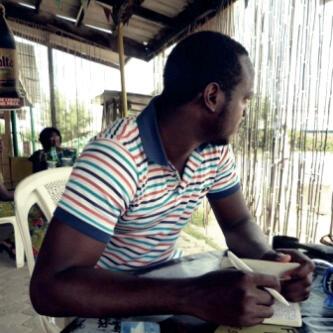 Oris Aigbokhaevbolo, a writer, critic, and essayist, is nominated for the African Journalist of the Year for his music writing. As a film critic, he has been invited to academies in Germany, South Africa and The Netherlands.
Oris Aigbokhaevbolo, a writer, critic, and essayist, is nominated for the African Journalist of the Year for his music writing. As a film critic, he has been invited to academies in Germany, South Africa and The Netherlands.
His reportage and reviews on cinema, pop music and literature appear in Chimurenga, This is Africa, The Africa Report, and The Guardian UK. He holds a degree in Pharmacy and tweets from @catchoris.


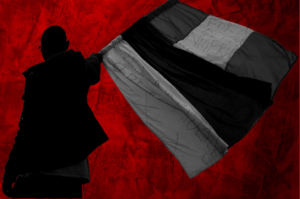
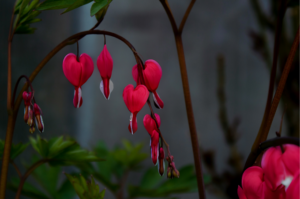
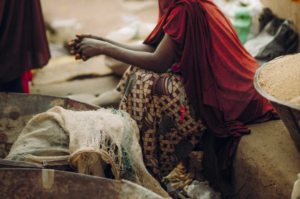
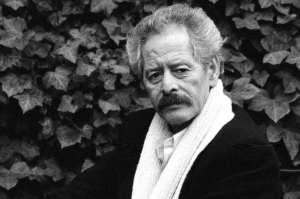
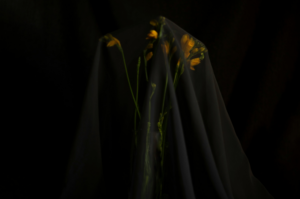


David Stryker May 13, 2020 11:43
I have nothing to add to this thorough take-down except my shock at reading that Achebe’s prose is ‘spotty’ in TFA; to me it’s perfect - and of course there is plenty to say about it! On the contrary, while I love Anthills, I found it also more long-winded at times and less structured than the trilogy novels, which are true gems in my opinion.